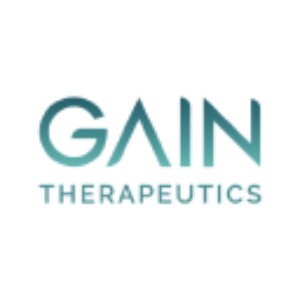Gain Therapeutics Presents Positive Preclinical Data on its Small Molecule Lead Compound in GBA1 Parkinson’s Disease at XXVII IAPRD World Congress
Rhea-AI Summary
Gain Therapeutics, Inc. (Nasdaq: GANX) has announced promising pre-clinical results for its lead compound, GT-02287, targeting Parkinson’s Disease. Presented at the XXVII World Congress on Parkinson’s Disease, the compound successfully penetrates the brain, reduces alpha-synuclein levels, and improves dopamine production in neuronal models. Data showcases its ability to bind with the GCase protein, enhancing lysosomal function. The findings suggest potential disease-modifying effects, positioning GT-02287 as a candidate for clinical advancement this year.
Positive
- Pre-clinical data shows GT-02287 can penetrate the brain, targeting GCase protein.
- Compound reduces alpha-synuclein levels and improves dopamine production in neuronal models.
- Potential therapeutic impact for patients suffering from Parkinson's disease is highlighted.
Negative
- None.
News Market Reaction – GANX
On the day this news was published, GANX declined 11.37%, reflecting a significant negative market reaction.
Data tracked by StockTitan Argus on the day of publication.
Lead Compound GT-02287 is Brain Penetrant, Reduces Alpha-synuclein, and Increases Dopamine in Relevant Neuronal Models
BETHESDA, Md., May 06, 2022 (GLOBE NEWSWIRE) -- Gain Therapeutics, Inc. (Nasdaq: GANX) (“Gain”, or the “Company”), a biotechnology company applying its proprietary computational discovery platform to identify novel targets and small molecule treatments, today announced that it presented positive pre-clinical data from its GBA Parkinson’s Disease (PD) program. The results were highlighted in a poster presentation at the XXVII World Congress on Parkinson’s Disease and Related Disorders (IAPRD) held May 1 - 4, 2022, in Prague, Czech Republic. The data demonstrate the ability of lead compound GT-02287 to penetrate the brain, target and bind with the beta-glucocerebrosidase (GCase) protein, avoiding its degradation and allowing its transport to the lysosomes where the enzyme can carry out its biological function.
“The data we presented at IAPRD further supports the therapeutic potential of our lead compound to alter the course of historically challenging neurodegenerative diseases,” said Eric Richman, Chief Executive Officer of Gain. “The disease modifying potential of this compound may have a profound effect for patients suffering from Parkinson’s disease.”
Dr. Manolo Bellotto, Chief Strategy Officer, commented, “We continue to focus on targeting the cause of the disease, rather than its symptoms, and the data here today continue to demonstrate that enhancement of the lysosomal GCase activity by GT-02287 protects against key pathological features of PD, including alpha-synuclein related pathology, improving the phenotype of dopaminergic cells. We look forward to sharing additional findings as we continue to advance GT-02287 towards the clinic this year.”
The data were generated in two different in vitro models and an in vivo model. The in vitro models used were the rotenone model in SH-SY5Y dopaminergic neurons and the CBE model in cortical neurons, both of which are used to model disease pathology. The in vivo data was produced using the rotenone model in rats, which causes an increase in aggregated alpha-synuclein and a reduction in dopamine levels in the striatum, both of which are well known markers of the disease.
The presentation titled “GT-02287, a Brain-Penetrant Structurally Targeted Allosteric Regulator for Glucocerebrosidase Shows Evidence of Pharmacological Efficacy in Models of Parkinson’s Disease” showed that the orally bioavailable and brain-penetrant lead molecule had a promising effect, including:
- Penetration of the compound in the brain and plasma
- Reduction of P129-alpha-synuclein levels in SH-SY5Y Dopaminergic neurons after rotenone injury
- Improved alpha-synuclein pathology in TH+ neurons after CBE injury
- Reduction of aggregated alpha-synuclein in the substantia nigra and increase in dopamine levels in the striatum in Rotenone injured rats
A copy of the poster is available on the Gain Therapeutics website at https://www.gaintherapeutics.com.
About Parkinson’s Disease
Mutations in the GBA1 gene, encoding the lysosomal enzyme GCase, represent the most common genetic risk factor for PD. Impaired GCase function has garnered attention due to its association with α-synuclein pathology in GBA-associated PD patients, but also in sporadic PD, as well as in related α-synucleopathies. Although less investigated, decreased GCase levels and activity is also involved with the pathophysiology of AD. Enhancing the activity of mutant and wild-type GCase may represent a therapeutic strategy for the treatment of neurodegenerative diseases.
About Gain Therapeutics, Inc.
Gain Therapeutics, Inc. is transforming the drug discovery paradigm with structurally targeted allosteric regulators identified with its proprietary computational discovery platform SEE-Tx®. The ability to identify never-seen-before allosteric targets on proteins involved in diseases across the full spectrum of therapeutic areas provides opportunities for a range of drug-protein interactions, including protein stabilization, protein destabilization, targeted protein degradation, allosteric inhibition and allosteric activation. Gain’s pipeline spans neurodegenerative diseases, lysosomal storage disorders, metabolic diseases and oncology. Gain’s lead program in Parkinson’s disease has been awarded funding support from The Michael J. Fox Foundation for Parkinson’s Research (MJFF) and The Silverstein Foundation for Parkinson’s with GBA, as well as from the Eurostars-2 joint program with co-funding from the European Union Horizon 2020 research and Innosuisse. For more information, please visit https://www.gaintherapeutics.com.
Investor & Media Contacts:
Gain Therapeutics Investor Contact:
Noor Pahlavi
Argot Partners
(212) 600-1902
Gain@argotpartners.com








